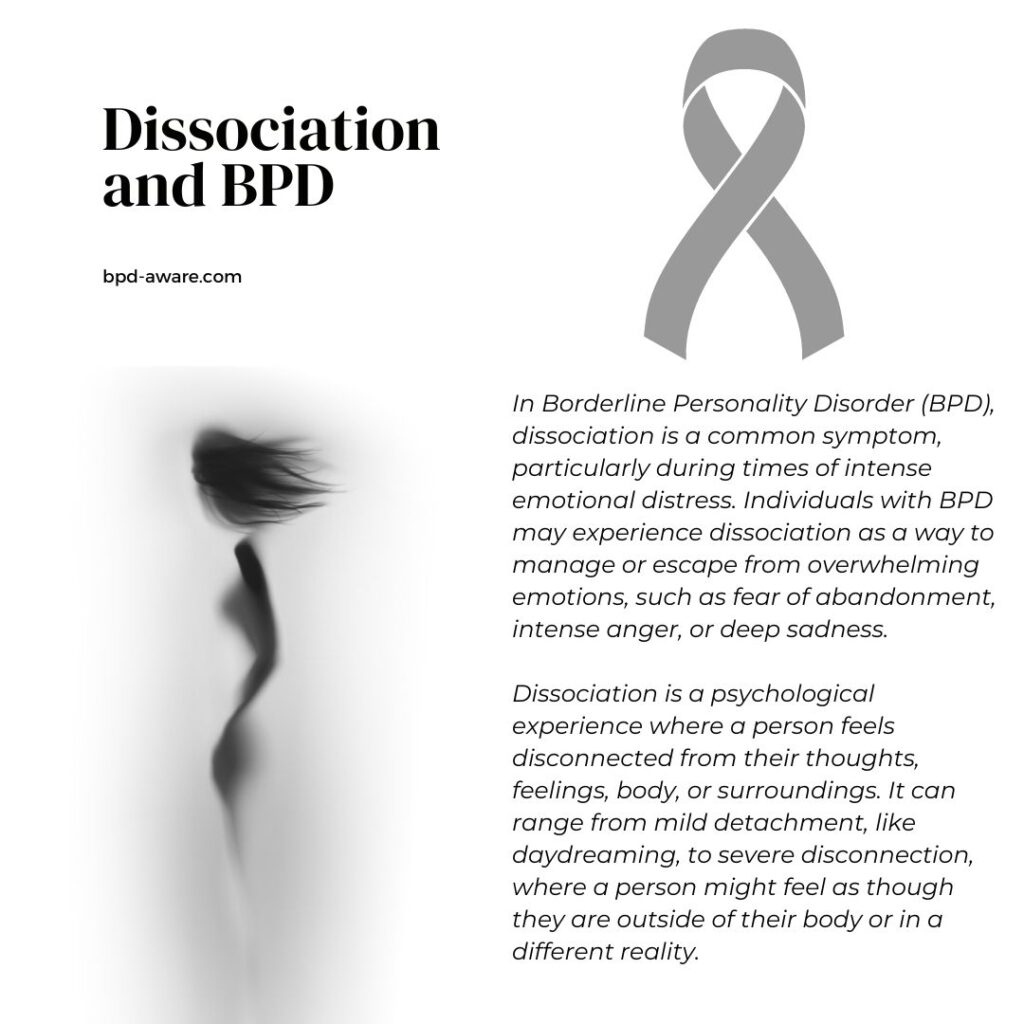Dissociation in times of stress is one of the nine symptoms of Borderline Personality Disorder (BPD). However, unlike the more obvious symptoms like rapid mood swings or unstable relationships, not everyone is as familiar with dissociation and the ways it can manifest.
In this article we will take a deep dive into dissociation, its different types, how dissociation impacts people with BPD, and the experiences of dissociation our readers have shared with us.
What Is Dissociation?
Dissociation is a coping mechanism in which an individual disconnects or detaches themselves from reality. Dissociation can affect thoughts, memory, consciousness, identity, and awareness of surroundings. While not everyone with BPD will experience dissociation, one study found that between 75% and 80% of people with BPD reported experiencing stress-induced dissociation at some point during their lives.
Someone experiencing dissociation may feel like they’re detached from their own body as if they’re having an out-of-body experience and merely watching themselves from the outside looking in. Dissociation can also feel as if the world the person is living in isn’t real, as if it were a fake reality. We will dig deeper into the different types of dissociation later in this article.
Dissociation exists on a spectrum, much as BPD exists on a spectrum. There can be mild cases of dissociation (such as daydreaming or zoning out) to much more severe cases that can be debilitating. Mild cases are considered normal and nothing to worry about. However, moderate-to-severe dissociation can be distressing and significantly impact someone’s functioning ability. Imagine believing that you weren’t real or the world around you was fake; it makes going to work, preparing food, and talking to friends feel incredibly strange and difficult!
Dissociation is typically a response to trauma or heightened levels of stress and has been linked to childhood trauma, as has BPD. As mentioned earlier, dissociation is a coping mechanism; a way to mentally escape from a distressing situation. It’s a way to “disconnect” from the present moment to avoid overwhelming pain or anxiety.
In the case of BPD, dissociation can also act as a defense mechanism, protecting the sufferer from emotional overload or unresolved trauma. For people with BPD, dissociation can be triggered by heightened levels of stress, panic, or fear. As the BPD brain is often in “fight or flight mode”, it’s not uncommon for someone with BPD to dissociate regularly.

What Are The Different Types of Dissociation?
There are several different types of dissociation, which can range from mild to severe in terms of the effect they can have on the individual.
Everyday Dissociation (Mild): Everyday dissociation includes daydreaming and zoning out. It also includes highway hypnosis where the driver may drive for a long time and reach their destination with little memory of the journey. These are considered mild forms of dissociation that are more to cope with boredom than anything else.
Absorption and Detachment (Moderate): Absorption occurs when someone is so intently focused on a task that they lose track of time or the world around them.
Detachment is when someone feels disconnected from their feelings or surroundings. Generally, neither absorption nor detachment is considered harmful but they can be warning signs as they represent deeper levels of dissociation than everyday dissociation.
Depersonalization (Moderate to Severe): Depersonalization is when someone feels detached from their own body. They might feel like they’re observing their own life rather than actively participating. This can feel dreamlike and incredibly disorientating.
Derealization (Moderate to Severe): During realization, the person may feel as if the world they live in is unreal or distorted in some way. Much like depersonalization, this can feel dreamlike in a way. The world may also seem foggy, artificial, or as if time has been sped up or slowed down.
Dissociative Amnesia (Severe): Dissociative amnesia is memory loss beyond what can be rationally explained by mere forgetfulness. People experiencing dissociative amnesia may forget personal information, specific events, or even entire periods of their lives. This memory loss can be specific to a period, or span the individual’s life.
Dissociative Fugue (Severe): A dissociative fugue is when someone travels away from their usual location with either no memory of their past or how they got there. This is something I have experienced in the past and it’s incredibly disorientating. In my case, I was meant to go somewhere by public transport but I awoke from my fugue in a completely different location with no memory of the journey. Fortunately, it was somewhere I was somewhat familiar with.
In other cases though, people may find themselves somewhere they aren’t familiar with, which leads to further distress. They may also, during their fugue state, assume a new identity or act in a manner they wouldn’t normally behave.
Identity Confusion (Severe): During identity confusion, someone may be confused or uncertain about who they are. They may have trouble defining who they are as a person or feel like they’re shifting between identities.
Dissociative Identity Disorder (DID) (Most Severe): Formerly known as Multiple Personality Disorder, people with DID experience at least two or more distinct identities. These identities may have their own names, memories, behaviors, and personalities. DID is associated with severe, prolonged childhood trauma although that isn’t always the case. One study found that between one-third and two-thirds of people with BPD experience DID at some point during their lives.
How Dissociation Impacts People With BPD
Dissociation often occurs during heightened states of emotion. These overwhelming states of emotion are common within BPD. Someone with BPD in a dissociative state may experience a dampening or numbing of emotions. This can provide a sense of relief but can also be disorientating or confusing.
It’s common for people with BPD to struggle with their identity and dissociation can greatly exacerbate this. When someone dissociates they experience being disconnected from the self or reality. Feeling this disconnection only makes it more challenging to establish a firm identity.
Dissociation can also harm relationships. The person dissociating may not be able to concentrate on conversations, remember plans, or even notice that the other person is there! This can drive a wedge in any relationship which then further triggers the person with BPD, especially if they suffer from a fear of abandonment.
Dissociative episodes can lead to impaired decision-making. The feeling of living in a dreamlike world can cause some people to make decisions that they might not normally make. This can include behavior that would be considered risky or even immoral. Impulsivity is already a known symptom of BPD, and dissociation can make impulsivity even worse.
Coping Strategies For Dissociation
Fortunately, dissociation can be treated through a combination of therapy and coping strategies. A BPD treatment program will typically include medication and therapy, which can reduce the number and severity of dissociative episodes.
Treatment will also teach you several coping strategies for dealing with dissociation, some of which we can share with you below.
Sensory Grounding: Focusing on your senses and what they are experiencing can help you reconnect with the present moment. There are many ways to do this. For example, you may light a scented candle and focus on the pleasant smell that it creates, or you could choose a color and look for every example of that color in the room you’re in.
Breathing Exercises: Much like sensory grounding, focusing on breathing can calm the nervous system and bring awareness back to the self. Breathing exercises can be as simple as counting the number of breaths you take or breathing so that there are no pauses between inhalation and exhalation.
Body Scans: Mentally scan each part of your body, from your toes up to your head, and observe what each body part is experiencing. This can include things like temperature, any aches or pains, comfort level, muscle tightness, and so on. This helps to reconnect you to your own physical experience.
TIPP Skills: As taught in Dialectical Behavioral Therapy (DBT), TIPP Skills involve things like dunking your face in cold water or undertaking vigorous exercise to shake yourself out of your dissociative state. You can read our article on TIPP Skills for more techniques and information about how this works.
Your Experiences With Dissociation
We always like to ask our readers about their experiences with the topics we cover here at BPD-Aware. Several people have been kind enough to share their experiences with dissociation, what it feels like for them, and how it’s affected them. If you’d like to share your experiences with dissociation or ask any questions, you can do so in the comment box at the end of this article or by visiting us over at our BPD Forums.
“I don’t know if my dissociation is related to my BPD or if it’s something else entirely separate. One thing I’ve noticed is that it tends to be affected by seasonal changes, particularly from summer to fall. Everything feels kind of distant and hazy, almost more like a memory than the present day. If anything, it seems to calm down my BPD but it’s still unsettling nonetheless.” – Carly C.

“When I dissociate, it feels like all my senses have been dialed down. Normally, everything feels like it’s turned up to eleven for me, but dissociation brings it right down to a three or a four. My mind is fuzzy and I can’t think clearly. It’s like I’m a passenger observing everything through a lens that slows everything down and makes it look blurry. Sometimes I feel so numb that I have to pinch myself or slap my thigh to jolt myself back to life.” – Brian L.
“I experience dissociating in a few different ways but the one that’s most common for me is derealization. The way I like to describe it is to imagine there are multiple universes and you’ve been shifted to one that’s remarkably similar but something doesn’t quite feel right. You try and work out what’s not right but nothing jumps out. Just a vague sense of wrongness.” – Alexander S.
Sources, Resources, and Further Reading
- Dissociation, trauma, and borderline personality disorder: https://bpded.biomedcentral.com/articles/10.1186/s40479-022-00184-y
- Overcoming the 3 Types of Dissociation in Borderline Personality Disorder (BPD): https://www.youtube.com/watch?v=96sTz5N_5io
- What is dissociation like for you?: https://www.reddit.com/r/BPD/comments/15o9rho/what_is_dissociation_like_for_you/
















